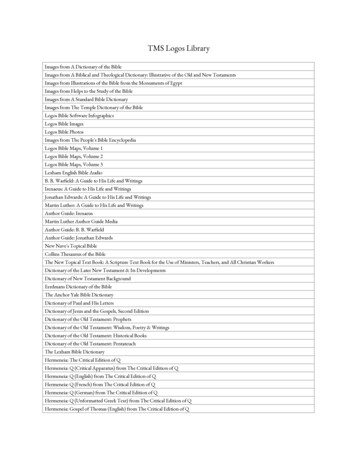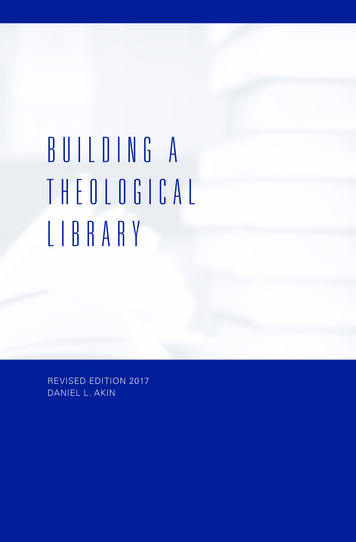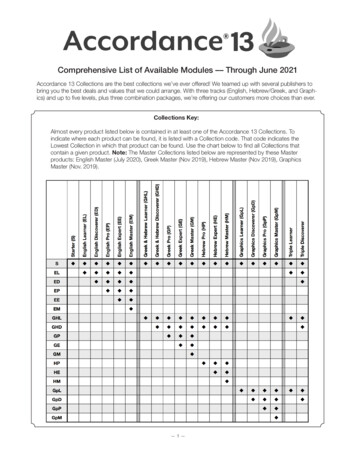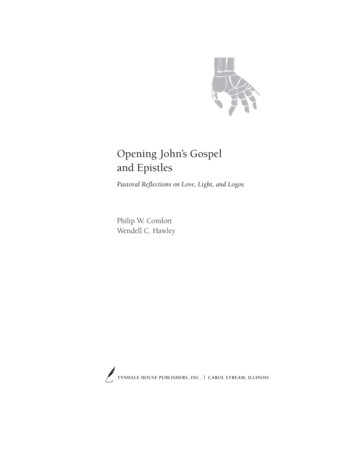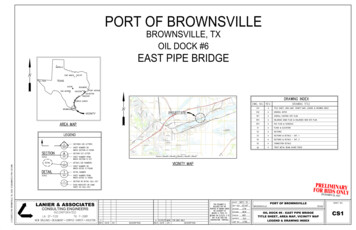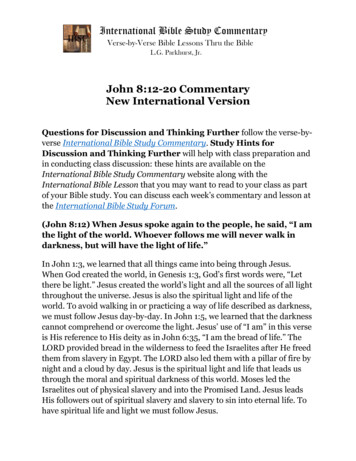
Transcription
John 8:12-20 CommentaryNew International VersionQuestions for Discussion and Thinking Further follow the verse-byverse International Bible Study Commentary. Study Hints forDiscussion and Thinking Further will help with class preparation andin conducting class discussion: these hints are available on theInternational Bible Study Commentary website along with theInternational Bible Lesson that you may want to read to your class as partof your Bible study. You can discuss each week’s commentary and lesson atthe International Bible Study Forum.(John 8:12) When Jesus spoke again to the people, he said, “I amthe light of the world. Whoever follows me will never walk indarkness, but will have the light of life.”In John 1:3, we learned that all things came into being through Jesus.When God created the world, in Genesis 1:3, God’s first words were, “Letthere be light.” Jesus created the world’s light and all the sources of all lightthroughout the universe. Jesus is also the spiritual light and life of theworld. To avoid walking in or practicing a way of life described as darkness,we must follow Jesus day-by-day. In John 1:5, we learned that the darknesscannot comprehend or overcome the light. Jesus’ use of “I am” in this verseis His reference to His deity as in John 6:35, “I am the bread of life.” TheLORD provided bread in the wilderness to feed the Israelites after He freedthem from slavery in Egypt. The LORD also led them with a pillar of fire bynight and a cloud by day. Jesus is the spiritual light and life that leads usthrough the moral and spiritual darkness of this world. Moses led theIsraelites out of physical slavery and into the Promised Land. Jesus leadsHis followers out of spiritual slavery and slavery to sin into eternal life. Tohave spiritual life and light we must follow Jesus.
2An often-used synonym for the spiritual light that Jesus gives is “truth.”When we follow Jesus, we follow the truth—the truth of Jesus’ words in theGospels and the truth of the whole of Scripture. Spiritual darkness includesthe moral darkness and spiritual falsehoods that lead to death, but the truthof Jesus can lead us out of moral and spiritual darkness and into the truthof God and all reality (for Jesus created all the reality of the world). Thoseof whom the Bible calls “this world” walk in moral and spiritual darkness.When Jesus spoke to the religious authorities and unbelievers in John 8:23,He said, “You are from below, I am from above; you are of ‘this world,’ I amnot of ‘this world’.” Therefore, without the help of the Holy Spiritunbelievers will not comprehend the light (the truth) that they often seek toovercome when they “suppress the truth in unrighteousness” (Romans1:18).As Christians, to help unbelievers we must pray for them as well as teachthem the truth of the Scriptures. Those who follow Jesus do not walk inmoral and spiritual darkness; rather, they become lights that shine in thedarkness. In Jesus’ Sermon on the Mount, in Matthew 5:14-16, Jesus said,“You are the light of the world. A city built on a hill cannot be hid. No oneafter lighting a lamp puts it under the bushel basket, but on the lampstand,and it gives light to all in the house. In the same way, let your light shinebefore others, so that they may see your good works and give glory to yourFather in heaven.” To let our lights shine we must walk in the truth of Jesusthat includes Jesus’ words and deeds. As Christians, we must walk in theeternal life and light that Jesus gives us now. In John 14:6, Jesus said, “I amthe way, and the truth, and the life. No one comes to the Father exceptthrough me.” If we follow Jesus and His teachings daily, we will have thelight we need to walk in this life, and we will always be with Jesus.(John 8:13) The Pharisees challenged him, “Here you are,appearing as your own witness; your testimony is not valid.”The Pharisees did not refute the truth of Jesus’ words, for they could notovercome or comprehend the truth. They challenged Jesus by saying Histestimony (like a witness in a trial) was not valid (legally acceptable).Because it was not valid, they said His testimony should not be accepted.They said His witnessing about himself was not valid because it did not
3conform to the Law of Moses regarding testimony in a legal proceeding ortrial. In Deuteronomy 19:15, we learn that to legally substantiate thatsomething happened or is true there must be two witnesses. In their effortsto suppress the truth, the Pharisees wanted to completely disqualify Jesusas a witness for himself; they claimed that Jesus testified in His own behalfand there was no second witness.(John 8:14) Jesus answered, “Even if I testify on my own behalf,my testimony is valid, for I know where I came from and where Iam going. But you have no idea where I come from or where I amgoing.Jesus replied that He was emotionally, mentally, and spiritually qualified totestify in His own behalf because He knew where He had come from (fromHis Father in heaven) and where He was going (back to His Father inheaven) when His saving work in the world was done. Jesus knew himself,but because the Pharisees did not know Jesus, that He was sent by theFather and returning to the Father and that He was the Son of God, theydid not consider His testifying about himself as valid. If they had knownGod and Jesus, they would have accepted His testimony as the testimony ofthe divine Son of God.(John 8:15) You judge by human standards; I pass judgment onno one.Jesus accused the Pharisees of judging by their own “this world” standardsand not God’s standards. They claimed to judge by the Law of Moses, buttheir words and actions showed that they judged by their own sinful humanstandards. The standards of darkness and of this world motivated them totry to trap Jesus and kill Him on more than one occasion. Jesus revealedhow they judged by human standards instead of God’s standards when theybrought the woman caught in adultery for Him to judge and condemn.Following the Law of Love, Jesus did not come to judge and condemnsinners, but to save them, so He did not condemn the woman. ThePharisees did not really judge according to what the Bible taught; instead,they judged others based on their own human sinfulness, their Phariseemade laws and rules that set aside the Law of God, the Law of Love—just as
4most governments (human and religious) of this world do today.Jesus did not judge people based on human standards, but by God’sstandards as revealed in the Scriptures, God’s Word (up to that time beforeJesus’ commands in the Gospels were written). Jesus did not come to judgethe world but to save it. In John 3:19-21, we learned, “And this is thejudgment, that the light has come into the world, and people loveddarkness rather than light because their deeds were evil. For all who do evilhate the light and do not come to the light, so that their deeds may not beexposed. But those who do what is true come to the light, so that it may beclearly seen that their deeds have been done in God.” The Pharisees judgedby human standards that were evil; therefore, they condemned Jesus who is“the true light of the world,” who came to save the world and not judge.(John 8:16) But if I do judge, my decisions are true, because I amnot alone. I stand with the Father, who sent me.Jesus said that even if He judged, and He will judge on the Last Day whenHe returns, His judgment is valid because He is not judging by himself. TheFather and He, two witnesses, judge together; therefore, His judgment isvalid according to the Law of Moses rightly interpreted and applied. Jesusand the Father together make valid judgments because of who they are:God the Father and the Son of God, who the Father sent to save and notcondemn. Yet, judgment does come in relation to Jesus. In John 3:16-18,we learned, “For God so loved the world that he gave his only Son, so thateveryone who believes in him may not perish but may have eternal life.Indeed, God did not send the Son into the world to condemn the world, butin order that the world might be saved through him. Those who believe inhim are not condemned; but those who do not believe are condemnedalready, because they have not believed in the name of the only Son ofGod.”(John 8:17) In your own Law it is written that the testimony oftwo witnesses is true.To substantiate what He taught (and as an example to all believers) Jesusreferred to the Scriptures. Jesus always upheld the Law of God in the
5Hebrew Scriptures and gave the correct divine interpretation andapplication of God’s law. After making the claims about who the Father andwho the Son were, and indicating that because of who they were theirjudgment was valid, Jesus referred them back to the Word of God written.As well as being divine, the Father and the Son fulfilled the Law of Moses inthe Scriptures. They were God and they judged by God standards—nothuman standards or the standards of this world.(John 8:18) I am one who testifies for myself; my other witness isthe Father, who sent me.”In several ways throughout John’s gospel, Jesus declared that He was theSon of God and His Father gave testimony that He was the Son of God. Thesigns and works Jesus did that accompanied His words about himself weresome of the ways the Father who sent Him into the world gave witness inbehalf of Jesus. In John 10:37-38, Jesus told the Jews, “If I am not doingthe works of my Father, then do not believe me. But if I do them, eventhough you do not believe me, believe the works, so that you may know andunderstand that the Father is in me and I am in the Father.” The Father andJesus always worked and spoke together in perfect agreement.(John 8:19) Then they asked him, “Where is your father?” “Youdo not know me or my Father,” Jesus replied. “If you knew me,you would know my Father also.”For the most part, with Nicodemus being a notable exception, the religiousleaders refused to believe Jesus or accept the signs He performed as fromGod. They chose to remain in darkness and suppress the truth Jesus’ signspointed toward because their deeds were evil. Therefore, even though theyknew many facts about God from the Scriptures, they did not know God.They knew neither Jesus nor the Father. Jesus then made the amazingstatement to them (and to us) that means: to know Me is to know theFather. Throughout the Bible, Jesus perfectly reveals God the Father.(John 8:20) He spoke these words while teaching in the templecourts near the place where the offerings were put. Yet no oneseized him, because his hour had not yet come.
6The temple treasury was not where the priests stored the temple treasuresor offerings. The treasury was where the priests collected offerings forvarious temple purposes in trumpet-shaped boxes. It was near, or in theplace in the temple, where the women could meet but could go no furtherinto the temple. By teaching in the temple treasury, Jesus could teach bothmen and women. The Pharisees wanted to arrest Jesus. The scribes andPharisees tried to entrap Jesus. The temple police had been sent to arrestJesus. The only significant reason that John gives for Jesus not beenarrested after His stupendous claims about himself is “His hour had not yetcome.” It was not God’s perfect timing, perfect place, and perfect way forJesus to be arrested to fulfill the Old Testament prophets, and “His hour”eventually came when He glorified the Father and the Father glorified Him.Questions for Discussion and Thinking Further1. What types of light are there? What type of light is Jesus?2. How can someone avoid walking in darkness? What kind of darkness didJesus mean?3. What standards did the Pharisees use when judging? What standards didJesus use when judging?4. Who were or what were Jesus’ two witnesses in His behalf?5. If you know Jesus, who else will you know? Who did the Pharisees notknow? 2020 by L.G. Parkhurst, Jr. All Rights Reserved.Permission Granted for Not for Profit Use.Contact: P.O. Box 1052, Edmond, Oklahoma, 73083 and lgp@theiblf.com.
International Bible Study Commentary. website along with the . International Bible Lesson. that you may want to read to your class as part of your Bible study. You can discuss each week 's commentary and lesson at the . International Bible Study Forum. (John 8:12) When Jesus spoke again to the people, he said, "I am the light of the world.

